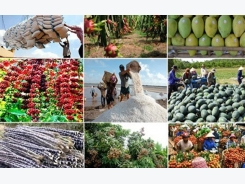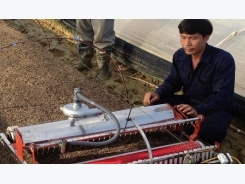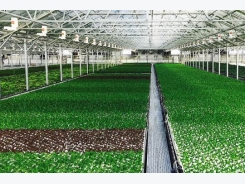Local agricultural products need more support

Viet Nam’s agricultural sector should focus on developing the economic value of domestic plant varieties by ensuring their output and protecting branding, instead of importing large amounts of other plant varieties. Otherwise, typical and valuable local species will disappear, experts have warned.
Farmers harvest garlic in Lý Sơn District. Lý Sơn garlic is a special and distinctive plant that could only be grown in the natural conditions of the island.
The warning was made after central Quảng Ngãi Province’s People’s Committee agreed in principle with two Japanese businesses to do research and grow Japanese elephant garlic as a pilot on Lý Sơn Island, which has long been known as the kingdom of garlic with distinctive high-nutrient varieties.
Specifically, Japan-based Nikken Sekkei Civil Engineering Ltd, in co-operation with CAN Holdings – a Japanese company specialising in hi-tech agriculture, proposed to grow elephant garlic on the island and then export it back to Japan.
The plant was introduced as a high-yield and high-value crop. About 4-5 tonnes of garlic can be harvested per hectare, bringing profit of VNĐ180,000 (US$8) per kilogramme for farmers.
Agricultural specialist Lê Tiến Dũng, who is also former head of the Huế University of Agriculture and Forestry’s Agricultural Faculty told Tiền Phong (Vanguard) newspaper that the import of another variety of garlic to the island with its small garlic cultivation area could seriously affect the existence and development of local plants.
Dũng said Lý Sơn garlic is a special and distinctive plant that could only be grown in the natural conditions of the island. It took a long time and much effort by local people to select and develop the current variety.
He cited "lonely garlic" which has only one clove as an example. This kind of high quality garlic requires special planting techniques and could be sold at the price of between VNĐ1-2 million ($44-88) per kilo.
If the imported variety was more productive and easier to cultivate, Lý Sơn garlic would not be able to compete and would gradually disappear, he said.
Lý Sơn garlic is one of the best varieties with high value that needs to be protected and developed. The problem was all about the protection of typical plants, not about high productivity.
To build a trademark for a local agricultural product was much more difficult. Imported garlic should be planted in places except for Lý Sơn Island, Dũng stressed.
According to the agricultural specialist, there were many lessons about importing plants. Japanese-imported Japonica rice was an example.
Although the rice variety has not been tested and accredited by the Ministry of Agriculture and Rural Development, the plant was planted on tens of thousands of hectares in the Mekong Delta region. Many hectares of domestic fragrant varieties such as Tám Xoan, Tám Thơm, Lúa Hương have been replaced by the imported plant.
Domestic-grown peanuts in the central region are another example. Lạc giấy, a special peanut variety in Thừa Thiên Huế Province, has disappeared from the crops of local farmers. It is now preserved in the Huế University of Agriculture and Forestry for gene conservation.
Lạc cúc in Nghệ An Province faced the same fate. Many peanut crops of local farmers have been replaced by Chinese-imported varieties.
Dũng said although the State had policies to restore and re-plant local varieties, not all of the varieties could be re-planted successfully or restored back to their origins.
Đặng Liên, a garlic farmer on Lý Sơn Island, said that he did not know anything about the import of garlic to the island and the quality of this variety.
Liên said the cultivated area on the island was restricted. Each person was given 110 square metres for garlic cultivation and many households had to lease land from other households to expand their crops.
If the new imported variety was planted on the island, the area for local products would surely decrease, he added.
Nguyễn Văn Tiến, another farmer in An Vĩnh Commune said he did not want to try a new variety as the problem was not about productivity.
“My three sào (1,080 square metres) of garlic field has stable productivity of between 1.5-1.8 tonnes, but the price is not stable as it depends on traders, so my profit is not stable,” he said.
Tiến said stable and long-term output was what he and other farmers expected most.
Nguyễn Viết Vy, secretariat of the Lý Sơn Island District said that the warning of the specialist was accurate, and that the provincial authorities need to consider carefully before planting the imported garlic variety on the island.
Vy said so far there was no specific information about the pilot project, so the district could not give further comment.
The district estimates that local farmers plant more than 330 hectares of garlic annually and harvest over 2,000 tonnes, bringing in VNĐ200 billion ($8.8 million) for farmers. In April, 2009, the brand ownership of Lý Sơn onions and garlic was recognised by the National Office of Intellectual Property of Việt Nam under the Ministry of Science and Technology.
Vy said the productivity of the plant had slightly reduced in recent years, so the district has reported to the province and asked for help from scientists.
The provincial People’s Committee said it had planned to build a factory producing garlic oil with Japanese technology to ensure the output of the plant
Related news
Tools

Phối trộn thức ăn chăn nuôi

Pha dung dịch thủy canh

Định mức cho tôm ăn

Phối trộn phân bón NPK

Xác định tỷ lệ tôm sống

Chuyển đổi đơn vị phân bón

Xác định công suất sục khí

Chuyển đổi đơn vị tôm

Tính diện tích nhà kính

Tính thể tích ao




 Coffee exports - carelessness is the loss of…
Coffee exports - carelessness is the loss of…  Greenhouse cultivation in Iran up 38%
Greenhouse cultivation in Iran up 38%